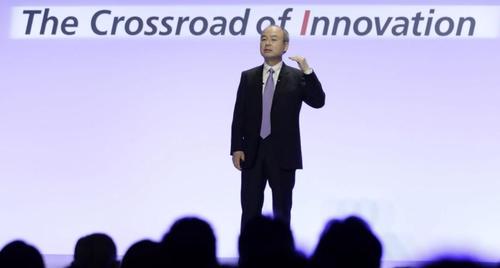SoftBank Reports Record Profits For Japanese Firm But Shares Slide As Market Demands Buybacks
SoftBank just capped off a series of robust quarterly earnings reports by delivering the biggest-ever quarterly profit for a Japanese firm: On Wednesday, the Japanese telecom firm with a VC arm reported net income of $17.7 billion – or ¥1.93 trillion – during the three months ended on March 31. This brought SoftBank’s annual net profit of ¥4.99 trillion (or $45.9 billion) for the 12 months period ended in March, marking a record not just for SoftBank, but for any Japanese company.
But investors found reason to doubt, as SoftBank shares slumped more than 3% after the earnings report was released. It’s important to note that unlike other companies that earn cash income by extracting oil (like Exxon) or selling digital advertising (like Facebook), practically all of SoftBank’s profits were attributed to investment gains in the vast portfolio of public and private companies owned by the firm. In Q1, these gains were largely driven by the newly public Coupang, a South Korean e-commerce giant struggling to emulate Amazon, which was responsible for nearly all of the firm’s profits.
As the FT’s Lex columnist pointed out, Of the 125 portfolio companies in SoftBank’s two Vision funds, gross returns depend on just a handful. Coupang, DoorDash and Uber make up 80% of the first fund’s gross return.
SoftBank founder and CEO Masayoshi Son argued during a presentation following the earnings report that investors aren’t giving him enough credit for all the value he has created at SoftBank. But with the WeWork fiasco still fresh in investors’ memories, we don’t blame them for still being skittish given the extreme volatility the firm has experienced in its investment returns.
As its earnings numbers showed, SoftBank’s ‘Vision Fund’ arm went from being the source of the company’s biggest losses ever just one year ago to the main driver of the firm’s profits. Vision Fund’s take amounted to ¥2.3 trillion in the quarter ended in March.
But while Masa tried to couch these volatile returns as part of a “new normal” at SoftBank, investors clearly still have some concerns.
“Our profit and revenue are both measured in trillions of yen, but just a year ago we had a record loss,” Son said during a post-earnings briefing with analysts and reporters. “For SoftBank, profits and losses in trillions of yen are the new normal.”
Their biggest concern is whether SoftBank will look to lock in more of its tech-heavy gains by buying back more of its stock. A massive share buyback program announced last year has already run out, though not before helping send SoftBank shares close to record highs, and reversing some of the firm’s post-WeWork losses.
On the subject of more buybacks, Masa sounded noncommital, which analysts said helped trigger a selloff in SoftBank shares.
“Yes, we will consider buying back our own shares,” Masa said. But he stressed that there are a lot of factors that go into these decisions, and that buybacks can’t simply be deployed to prop up the share price (even though ‘returning capital to shareholders’ is literally their only purpose).
Here’s a breakdown of the company’s Q1 profits: Coupang contributed $24.5 billion to Vision Fund’s Q4 profit. Auto1 Group, a German wholesale platform for used cars which went public in February, contributed $1.8 billion of the gains, while Uber was responsible for a $200M loss. SoftBank doesn’t need to sell shares to book income, so most of its profits are unrealized in the form of equity gains.
Kirk Boodry, an analyst at Redex Research in Tokyo, told Bloomberg that while he understand’s Masa’s rhetoric, he understands why investors are uncomfortable with the intense uncertainty baked into the company’s outlook.
“I get his points, but the last two years have shown there can be extreme volatility in returns and little agreement on future prospects.”
A senior analyst at Jeffries put it another way:
“The problem facing SoftBank is that the good news is already out,” said Atul Goyal, senior analyst at Jefferies. “What is less visible are the potential losses on blue-chip public stock investments and derivatives. The negatives are pretty opaque and that’s where investors will be looking at during earnings.”
SoftBank has a portfolio of 224 companies across three different funds as of the end of March, and Son says the company could see between 10 and 20 portfolio companies opt for public listings every year for the foreseeable future.
But replicating last year’s success will require SoftBank to duplicate the blockbuster returns in its investment portfolio. With a rout in US tech stocks already spreading to Asia, investors have reason to be skittish about SoftBank. After all, this is still the firm that once valued WeWork at $47 billion.
Tyler Durden
Wed, 05/12/2021 – 18:40
via ZeroHedge News https://ift.tt/3w2TkEU Tyler Durden
